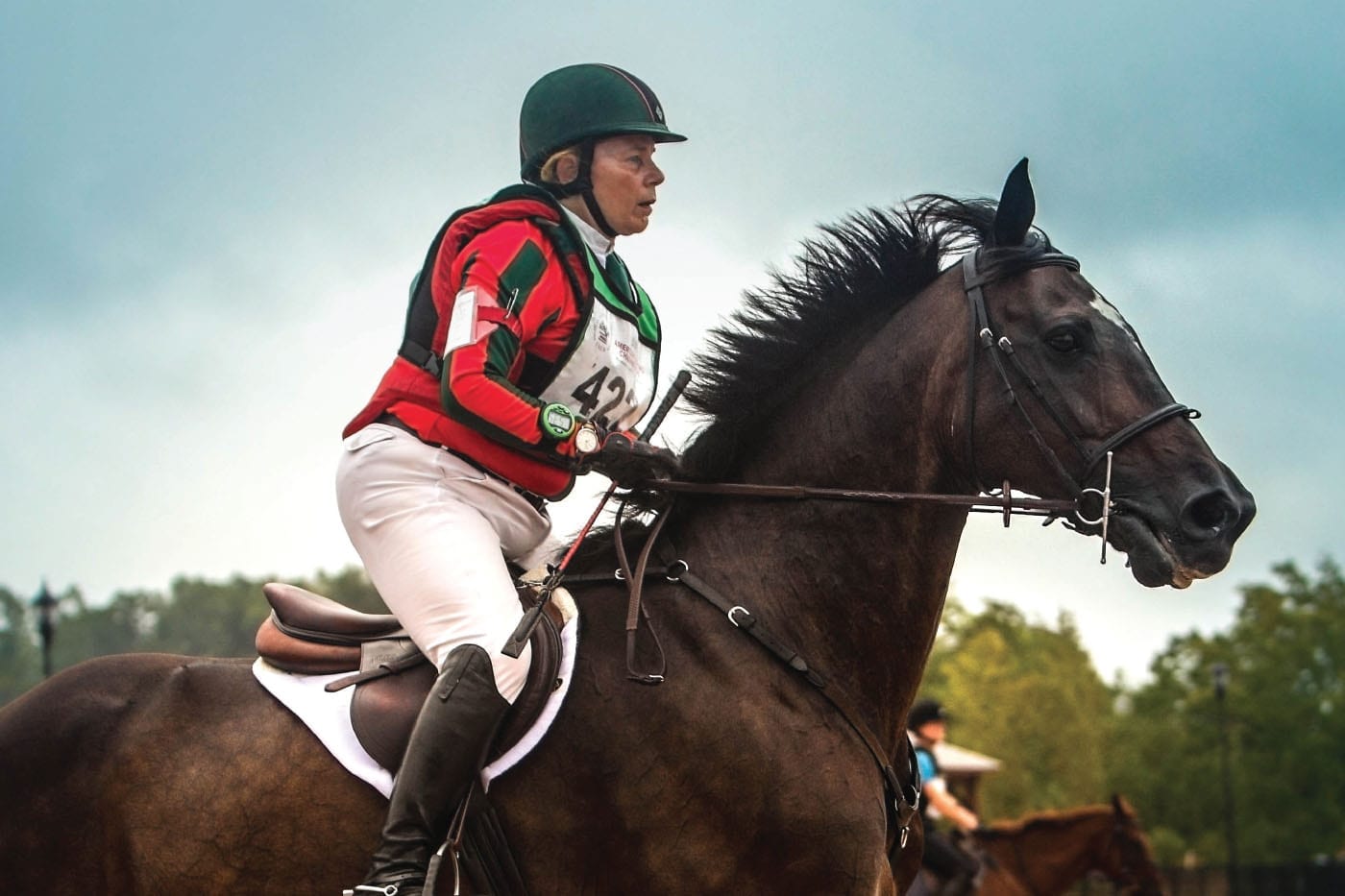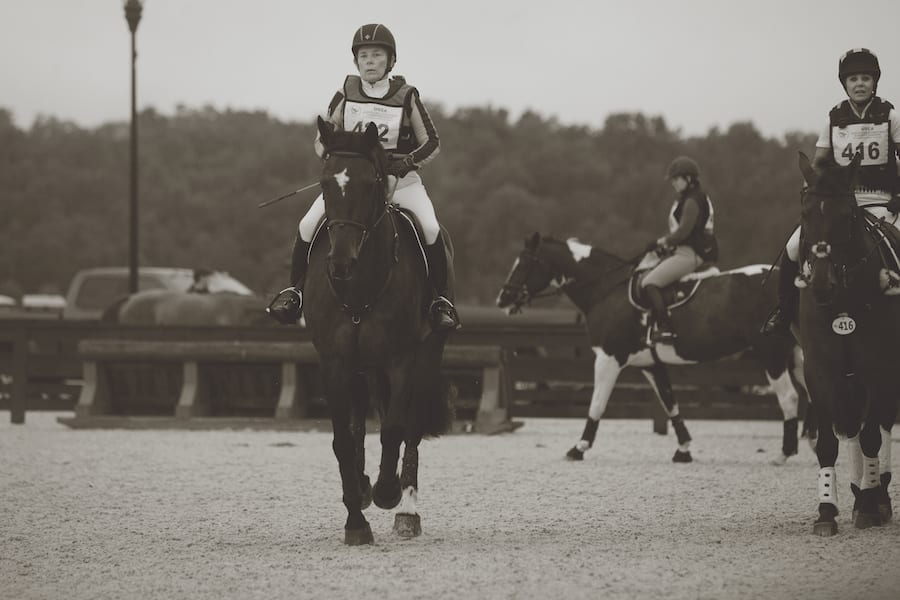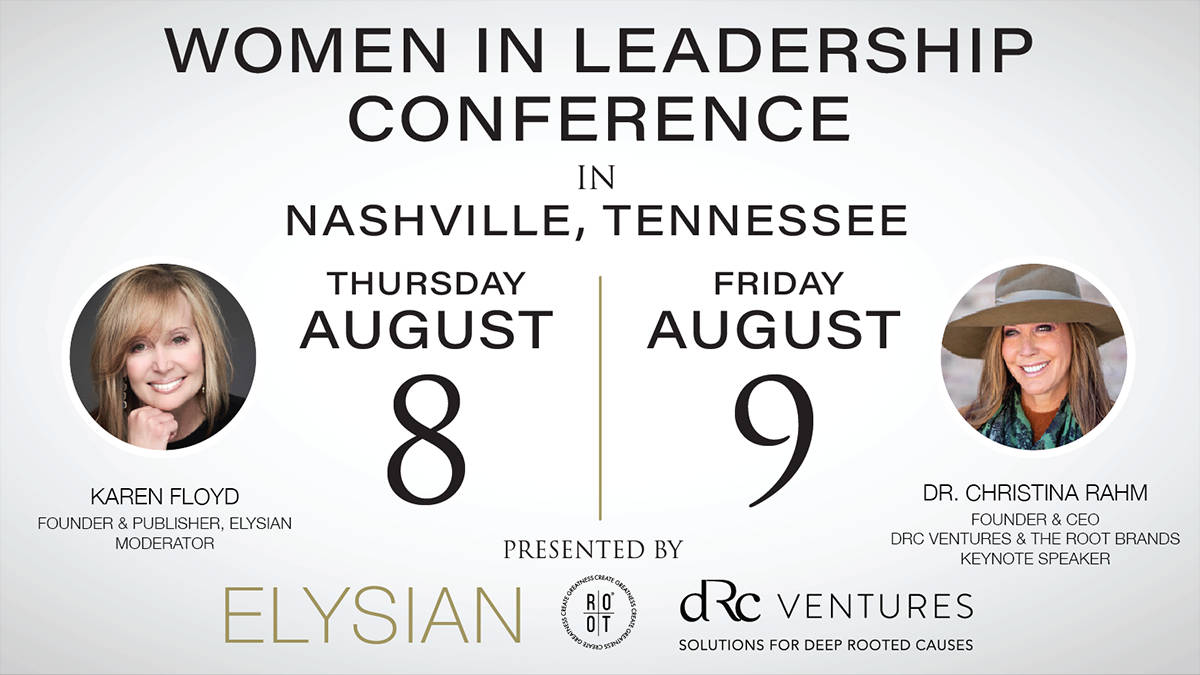“Fernanda Kellogg has had an enormous impact on the sport and we are
genuinely lucky to have someone of her caliber, vision and passion in our sport.”
– Rob Burk, CEO of the American Eventing Association
The Equestrian World’s Leading Lady
Fernanda Kellogg was the oldest competitor at the Tryon International Equestrian Center on this day, navigating its new and challenging cross country course on her 16.2-hand bay mare, Attlee. The footing was slick after two days of heavy rains, the remains of Hurricane Harvey as it wandered east over the Carolinas from Houston, but Fernanda sailed over the jumps at a hearty gallop. She guided Attlee over a grassy bank into a pool of water; then a few strides later, she leaped out of the water and over a fence to face a gauntlet of more jumps, jumps as wide as 4-feet- 11 inches, some built to look like miniature houses and coops that one might nd on a rolling countryside.
Not many 71-year-old women compete in three- day events, much less make it to the U.S. Eventing Association’s annual championship, an event that drew a record-breaking 755 horses this year to face a triathlon of equestrian competitions. Eventing requires riders to steer their mounts through a series of prescribed classical movements called dressage and then race around a cross-country course. The finale is a competition to beat the clock over stadium jumps.
Over the years, Fernanda has had brilliant rides, commanding spirited horses to victory at places like Madison Square Garden, Stable View Farm in South Carolina and to the hounds with the Millbrook Hunt in New York. From the outset, this day appeared to be another one of those rides, despite the rain and gusts of wind that made spectators huddle under ponchos.
But just as she was about to head to a final stretch, Fernanda lost her balance and fell off Attlee. “Rider down,” the announcer said. A hushed silence fell over the crowd as a medic team raced to the scene and removed her on a stretcher.
A few hours later, Fernanda, bruised and tired, was almost sanguine about her tumble and disqualification from the championship event, an event that she worked all year to qualify for by winning at three-day events around the country.
“It is the nature of our sport. My horse was going wonderfully. She took an extra big jump that unsettled me. Then we had the miscommunication and she went right, and I went left. Kaboom! Both my body and ego are suffering,” Fernanda gamely said. “It wasn’t the story book ending, but that is life.”
Fernanda is a rare breed of equestrian, a multifaceted leading lady of the horse industry who is widely admired for supporting every aspect of the sport from competing to supporting riders at the level of the World Equestrian Games and the Olympics.
“Fernanda Kellogg has had an enormous impact on the sport, and we are genuinely lucky to have someone of her caliber, vision and passion in our sport,” said Rob Burk, CEO of the American Eventing Association, the Virginia-based non-profit organization that oversees and educates the public about the sport.
Fernanda competes in at least one three-day eventing competition each month and trains five to six horses a week when she is not out fox hunting. She also serves on the American Eventing Owners Task Force, which helps event riders pair up with top-level horses. But she is perhaps best known for hosting a horse trials series with her husband, Kirk Henckels, on their 150-acre farm in Millford, New York.
The idea for the Fitch’s Corner Horse Trials was the brain child of Fernanda’s daughter, also named Fernanda, and her former barn manager, Eric Bull. Bull had just graduated from high school and was working for Fernanda while attending community college. The first year, the event drew about 60 horses, and it poured rain. Now celebrating its 25th anniversary, the event attracts more than 250 competitors from across the country and has become a major equestrian and social fixture on the international eventing circuit, featuring a dinner and dance, a market with 50-plus stores and a classic car show. “It was amazing that she even let us do it,” said Bull, describing how he and Fernanda’s daughter were teenagers at the time. Sure, Fernanda oversaw the event, but she largely gave Bull and her daughter the reins to control it, he said. Her belief in him is something that spurred Bull forward in his career. And there was also Mother Nature to thank.
“We got lucky because we had an epic monsoon at the end of the day, so all of our errors were written off because the competitors just wanted to duck and run for cover. Had the sun stayed out, it might not have gotten off the ground,” said Bull, laughing.
That was the first course that Bull ever designed and built. He had grown up around horses and competed, so he knew what the jumps should look like, but he had never built an actual course from scratch until that first horse trial. Today, Bull heads ETB Equine Construction based in Virginia, which builds cross-country courses and stadium jumps around the globe. He is widely considered a master of his profession, having built courses for the Pan American Games. Bull also has the contract to build the cross-country course for the World Equestrian Games next fall.
“We all sort of need that one break, that one person who is smart enough, or foolish enough, to give you that break in life,” Bull said. “Fernanda was that person for me.”
GROWING UP KELLOGG
Fernanda was born into New York’s rarified inner social circle as the daughter of Francis L. Kellogg, an American diplomat during the Nixon and Ford administrations, and Fernanda Wanamaker Munn Kellogg, a descendant of the Wanamaker Department store fortune and founder of the Louwana Fund in New York, an organization that raised money for African wildlife.
Fernanda fell in love with horses as a young girl and has competed since her prep school days. First, she was at the Foxcroft School in Virginia and then at the Knox School in New York, where she was trained by Harry de Leyer, the legendary equestrian who had a gut feeling about a horse headed for slaughter, rescued him and transformed him into the show jumper sensation known as “Snowman.” (A recent film called Harry and the Snowman showcases their remarkable story.)
“He made his students feel like they could jump the moon. He gave me courage to ride anything, and I carry that with me today,” Fernanda said.
Under de Leyer’s training, Fernanda earned enough blue ribbons to enter the 1968 National Horse Show at Madison Square Garden — one of the nation’s most respected hunter/jumper shows. She won the Amateur Owner division on Rafiki, who was ranked third in the American Horse Show Association’s Horse of the Year awards.
Riding kept her centered during her years at Bennett College. Riding was there too when she juggled being a single mom while working as senior vice president of public relations at Tiffany & Co. It was a busy, hectic time, but she found great solace in riding.
“Not many people know this, but Fernanda has equestrian blood running in her veins,” said Boyd Martin, a four- star eventer and member of the U.S. Olympic team.
The two meet in 2009 when Martin conducted a clinic at Fitch’s corner that has now become an annual event as well. Fernanda helped organize a group of investors to purchase a horse for Boyd to ride in the 2012 Olympics in London and the 2014 World Equestrian Games in Normandy, where Boyd finished in the top ten.
“Fitch’s Corner Horse Trials is really the Rolex of lower level eventing,” Martin said. “You would not find a better competition between the jumps and the cocktail parties.”
In addition to working with Boyd, Fernanda trains with his wife, the Grand Prix dressage rider Silva Martin, at Fernanda and Kirk’s winter abode, Fox Frolic Farm in Aiken.
“So many people love horses, but Fernanda is a classy person who unselfishly tries to make the sport better for the equestrian community and goes beyond the call of duty to improve the sport,” Martin said. “She is the first to host a fundraiser and first to back a new horse. I am not sure where she gets her energy. She can host a dinner party and be on her horse at 6 a.m. She truly is a remarkable woman, a leading lady of the equestrian world.”
And the best part, Boyd said, is that Fernanda would never let you know what she has accomplished. She does not wear her accomplishments on her sleeve.
THE MOST SPECTACULAR FALL OF ALL
Fernanda has had other falls over the years. But perhaps the most noted one came in 1997 when the Millbrook Hunt Club awarded her its Most Spectacular Fall trophy for falling in love with Kirk.
As the story goes, Fernanda met Kirk, vice chair of the blue chip New York real estate rm Stribling & Associates, after he bought a farm down the road. They happened to be seated next to each other at a dinner party and found that they not only had a love of all things equine in common, but dogs, high- powered careers and a love of nature.
Their courtship included riding the countryside and picnic lunches by hidden lakes. (Kirk is quite an equestrian himself — not only does he foxhunt, but he was a champion in his youth in the Texas Western Pleasure division.)
The pair have been happily married since 1998. They fox hunt together and travel to South America to go fishing, a joint passion. They frequently go to London to see Fernanda’s daughter, son-in-law and granddaughter. “Relax is not in her vocabulary,” said a bemused Kirk. “She does not sit on a beach very well, but we have a lot of fun together.”
Kirk even proposed while they were riding. “He reached into his hunt jacket pocket and pulled out a ring,” Fernanda told the New York Times at the time. “But who knew it was so difficult to kiss on horseback?”
A few days later, on their honeymoon in Idaho, Fernanda described her spectacular fall for Kirk to the newspaper: “He certainly knocked the wind out of me,” she said. “It happened over a period of time. It was not sudden, but it was the biggest fall I’ve ever taken.”
By Rebecca Car



